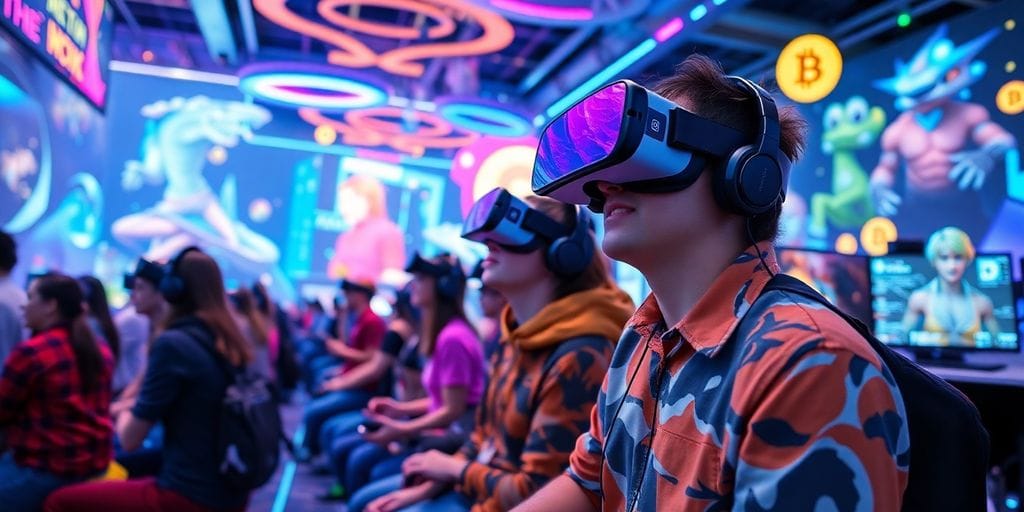The gaming world is changing, thanks to the rise of crypto gamers. These players are not just enjoying games; they’re reshaping how we think about ownership, rewards, and even the way games are made. With blockchain technology at the forefront, the gaming industry is experiencing a transformation that could redefine entertainment as we know it. Let’s take a closer look at how this shift is taking place and what it means for the future of gaming.
Key Takeaways
- Crypto is changing how players own and trade in-game items.
- Play-to-earn models allow gamers to make real money while playing.
- Interoperability lets players use assets across different games.
- Challenges like scalability and regulation still need to be addressed.
- The future of gaming looks promising with more immersive experiences.
How Crypto Is Transforming The Gaming Industry
Crypto is changing gaming, no doubt about it. It’s not just some small thing anymore; it’s a big shift. Think about it: games where you actually own stuff, economies run by players, and new ways to make money while playing. It’s a whole new world. Let’s get into the details.
The Synergy Between Crypto And Gaming
Crypto and gaming are becoming best friends. It’s a match made in digital heaven. Crypto brings things like blockchain-based gaming and NFTs to the table, which means players can own their in-game items and even make real money. This is a big deal because, before, everything you earned or bought in a game stayed in the game. Now, you can potentially take it with you or sell it. It’s changing the whole dynamic.
Innovative Ownership Structures
One of the coolest things about crypto in gaming is how it changes who owns what. Instead of game companies having all the power, players get a piece of the pie. This can look like:
- Owning in-game assets as NFTs.
- Participating in the game’s economy through tokens.
- Having a say in how the game is developed through decentralized autonomous organizations (DAOs).
This shift in ownership is a big deal. It means players are more invested in the game’s success, and they’re rewarded for their time and effort. It’s a win-win for everyone involved.
Enhanced User Experiences
Crypto isn’t just about making money; it’s also about making games more fun. Think about it: unique items, player-driven economies, and new ways to interact with other players. It’s all about creating a more immersive and engaging experience. Plus, with digital entertainment becoming more accessible, more people can get involved and enjoy the benefits of crypto gaming.
The Evolution Of Online Gaming Meets Blockchain Technology

Decentralized Solutions
Okay, so blockchain, right? It started as the thing behind cryptocurrencies, but now it’s popping up everywhere. One of the coolest places is in gaming, where it’s helping to make things more fair and open. Instead of game companies having all the power, blockchain lets players have a say. This means things like voting on game updates or even helping to run the game itself. It’s like turning the whole gaming world upside down in a good way. The blockchain gaming market is expected to reach $435 billion by 2028.
New Gameplay Mechanics
Blockchain isn’t just changing how games are run; it’s also changing how they’re played. Think about it:
- True Ownership: You actually own your in-game items, not just rent them.
- Play-to-Earn: You can earn real money or crypto just by playing.
- Unique Items: Blockchain makes it easy to create rare and one-of-a-kind items.
These new mechanics are making games more interesting and rewarding. It’s not just about winning anymore; it’s about building something valuable.
Impact On Game Development
Blockchain is also shaking things up for game developers. It lets them:
- Crowdfunding: Raise money directly from players.
- Transparency: Show exactly how rare items are.
- New Revenue Models: Earn money in new ways, like taking a cut of item sales.
This means smaller studios can compete with the big guys, and developers can be more creative without worrying about traditional publishers. It’s a win-win for everyone involved. The future of gaming is here, and it’s looking bright for gamers and developers willing to embrace this technology. The gaming industry is changing.
Play-To-Earn Models And Their Impact
Transforming Gaming Into Income
Play-to-earn (P2E) models are changing the game, literally. Instead of just sinking time and money into a game, players now have the chance to actually earn something. This shift is powered by blockchain tech, which allows for the creation of unique, tradable in-game assets. Think of it like this: your skills and efforts in the game translate into real-world value. It’s a pretty big deal.
Benefits For Players
So, what’s in it for the players? A lot, actually. Here’s a quick rundown:
- Real income potential: P2E games offer real-world value through in-game rewards.
- Ownership of assets: You actually own your in-game items, not just rent them.
- New ways to engage: P2E creates a more immersive and rewarding experience.
It’s not just about playing anymore; it’s about participating in a digital economy. Players can earn, trade, and even build their own businesses within these gaming ecosystems. This changes the dynamic completely, turning gamers into stakeholders.
Challenges Of Play-To-Earn
Of course, it’s not all sunshine and rainbows. P2E models face some serious challenges. One of the biggest is sustainability. If the game economy isn’t balanced, it can crash pretty quickly. Also, there’s the issue of accessibility. If a game requires a huge upfront investment, it’s going to exclude a lot of potential players. And let’s not forget about the potential for exploitation. Making sure these games are fair and fun for everyone is key. It’s a work in progress, but the potential is definitely there.
Interoperability Between Games

Shared Gaming Economies
Imagine a world where your hard-earned sword from one game isn’t just a bunch of pixels collecting dust, but something you can actually use in another game. That’s the promise of shared gaming economies. Blockchain makes it possible to create economies that span multiple games, allowing players to trade, sell, or even rent out their digital assets. This creates a more dynamic and engaging experience, where the value of your in-game items isn’t limited to a single virtual world. It’s like having a universal currency for gaming.
Cross-Platform Asset Use
Cross-platform asset use is a game-changer. Instead of starting from scratch in every new game, you can bring your favorite items, characters, or skills with you. This not only saves time and effort but also allows you to build a consistent identity across different gaming worlds. Think of it like this:
- You spend hours leveling up a character in one game.
- That character can then be used in a completely different game with a different storyline.
- The possibilities are endless, and it all comes down to the power of blockchain.
Enhancing User Experience
Interoperability isn’t just about cool features; it’s about making gaming more fun and rewarding. By allowing players to move assets between games, we’re creating a more connected and engaging experience. This can lead to:
- Increased player retention, as players are more invested in their digital assets.
- New opportunities for collaboration and competition between games.
- A more vibrant and dynamic gaming ecosystem overall.
Interoperability is a big deal because it changes how we think about digital ownership. It’s not just about owning something within a single game; it’s about owning something that has value across multiple platforms. This shift has the potential to revolutionize the gaming industry and create new opportunities for players and developers alike. The blockchain technology makes this possible.
Challenges And Considerations In Crypto Gaming
Scalability Issues
One of the biggest problems facing crypto gaming right now is blockchain scalability. Think about it: traditional games can handle thousands, even millions, of players at once. Blockchains? Not so much. Transactions take time, and fees can get crazy high when a lot of people are trying to do things at the same time. This can make playing crypto games a frustrating experience, especially if you’re trying to do something time-sensitive, like buying an item in a game auction. It’s a real hurdle that needs to be solved before crypto gaming can go mainstream.
Environmental Concerns
Okay, let’s talk about the elephant in the room: the environment. Some cryptocurrencies, especially those that use a "proof-of-work" system, use a LOT of electricity. All those computers working to verify transactions? They’re not exactly eco-friendly. This is a big concern for a lot of people, and it’s something the crypto gaming world needs to address. There’s a push for more energy-efficient blockchains, but it’s still a work in progress. People are starting to wonder if the benefits of play-to-earn models outweigh the environmental cost.
Regulatory Hurdles
Regulations are a big, messy question mark right now. Governments around the world are still trying to figure out what to do with crypto. Is it a currency? Is it a security? The rules are different everywhere, and they’re changing all the time. This makes it hard for game developers to know what they can and can’t do. It also makes it risky for players, because the rules could change at any time. It’s a legal minefield, and it’s slowing down the growth of crypto gaming assets.
It’s important to remember that crypto gaming is still new. There are going to be challenges along the way. Scalability, environmental impact, and regulations are all big issues that need to be addressed. But if the industry can find solutions, the future of gaming could be very bright.
Future Prospects Of Crypto In Gaming
Immersive Experiences
I think we’re going to see gaming worlds that are way more engaging. Imagine games where your character’s story actually matters, where the choices you make have real consequences in the game’s world, and where the items you earn are truly yours. Crypto and blockchain tech can make this happen by creating unique, verifiable digital assets and economies within games. This means your achievements and possessions in the game have actual value, making the whole experience more meaningful. It’s not just about playing a game; it’s about living in a digital world.
Decentralized Gaming Economies
The future of gaming economies is looking decentralized. This means less control from big companies and more power to the players and developers. Crypto can help create these economies by allowing for things like player-owned assets, transparent marketplaces, and fair revenue sharing. Imagine a game where you can easily trade items with other players, earn real money for your skills, and even have a say in how the game is developed. It’s a whole new level of player empowerment.
Potential For Innovation
Crypto in gaming is still pretty new, so there’s a ton of room for new ideas and experiments. We might see new types of games that we can’t even imagine yet, thanks to the unique features of blockchain tech. Think about games that are constantly evolving based on player input, or games that seamlessly blend the real world with the digital one. The possibilities are endless, and it’s exciting to think about what the future holds. The future of cryptocurrency is bright, and its impact on gaming will be profound.
It’s easy to see that crypto is changing gaming. It’s not just about adding a new payment method; it’s about changing how games are made, played, and owned. This shift could lead to a more open, fair, and engaging gaming experience for everyone involved. It’s a big deal, and it’s only just getting started.
Popular Crypto Integrations In Games
It’s still early days, but we’re already seeing some cool stuff happening with crypto in games. It’s not just about adding a token; it’s about changing how games work and how players interact with them. The integration of cryptocurrency and gaming is still in its early stages, but notable advancements are visible.
Notable Examples
Okay, so what games are actually doing this stuff? Well, Axie Infinity is a big one. It’s a strategy game where you collect and battle these creatures called Axies. The cool part is that these Axies are NFTs, meaning you actually own them, and you can trade them. Then there’s My Neighbor Alice, which uses the ALICE token to let players buy in-game assets. These games are showing how crypto can be more than just a gimmick; it can be a core part of the gameplay.
Success Stories
It’s tough to call anything a massive success just yet, but some games are definitely showing promise. Axie Infinity, for example, got super popular for a while, with people actually earning a living by playing. That’s a pretty big deal! It showed that play-to-earn models could actually work, at least in theory. Other games are seeing smaller-scale success, building dedicated communities around their crypto economies. It’s all about finding the right balance between fun gameplay and rewarding players with real value.
Emerging Trends
So, what’s next? A few things seem to be popping up. More games are using gaming tokens to reward players for completing quests. We’re also seeing more experiments with decentralized autonomous organizations (DAOs) to let players have a say in how the game is developed. Plus, there’s a lot of talk about interoperability – the idea that you could use your in-game assets across multiple games. It’s all still pretty experimental, but it’s exciting to see where things are headed. The future of blockchain gaming is looking bright.
It’s important to remember that this is all still new. There are challenges, like scalability and regulation, that need to be addressed. But the potential is there to create a whole new kind of gaming experience, one where players have more ownership and control.
Final Thoughts
As we wrap things up, it’s clear that crypto is shaking up the gaming world in a big way. This isn’t just a passing trend; it’s changing how we play and earn. With blockchain, players can truly own their in-game assets and even make money while having fun. The future looks promising for those who are ready to embrace these changes. Gamers, developers, and everyone in between should keep an eye on this space. The gaming landscape is evolving, and being part of this shift could lead to exciting new opportunities. So, are you ready to jump into this new era of gaming?
Frequently Asked Questions
What is crypto gaming?
Crypto gaming uses cryptocurrency and blockchain technology in video games, allowing players to earn real money or digital assets while playing.
How does cryptocurrency change the way games are played?
It allows players to truly own their in-game items, trade them, and even earn money through play-to-earn models.
What are play-to-earn games?
These are games where players can earn cryptocurrency or valuable items just by playing, making gaming a potential source of income.
Can I use my assets in different games?
Yes! Many crypto games allow players to use their assets across different games, creating a shared economy.
What challenges does crypto gaming face?
Crypto gaming faces issues like slow transaction speeds, environmental concerns, and the need for clear regulations.
What does the future hold for crypto gaming?
The future looks bright, with more immersive experiences and new ways for players to earn and interact in games.










